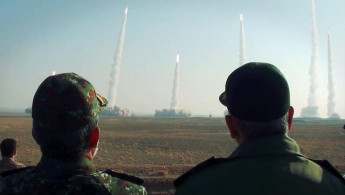Iranian Guard holds anti-warship ballistic missile drill
Footage showed two missiles smash into a target that Iranian state television described as "hypothetical hostile enemy ships" at a distance of 1,800 kilometers (1,120 miles). The report did not specify the type of missiles used.
In the first phase of the drill on Friday, the Guard's aerospace division launched surface-to-surface ballistic missiles and drones against "hypothetical enemy bases." Iranian state television described the drill as taking place in the country's vast central desert, the latest in a series of snap exercises called amid the escalating tensions over its nuclear programme. Footage also showed four unmanned, triangle-shaped drones flying in a tight formation, smashing into targets and exploding.
Tensions between Washington and Tehran have increased amid a series of incidents stemming from President Donald Trump's unilateral withdrawal from Iran's nuclear deal with world powers. Amid Trump's final days as president, Tehran has recently seized a South Korean oil tanker and begun enriching uranium closer to weapons-grade levels, while the US has sent B-52 bombers, the USS Nimitz aircraft carrier and a nuclear submarine into the region.
In recent weeks, Iran has increased its military drills as the country tries to pressure President-elect Joe Biden over the nuclear accord, which he has said America could reenter.
Iran fired cruise missiles on Thursday as part of a naval drill in the Gulf of Oman, state media reported, under surveillance of what appeared to be a US nuclear submarine. Iran's navy did not identify the submarine at the time, but on Saturday, a news website affiliated with state television said the vessel was American. Helicopter footage of the exercise released Thursday by Iran's navy showed what resembled an Ohio-class guided-missile submarine, the USS Georgia, which the US Navy last month said had been sent to the Persian Gulf.
Iran has missile capability of up to 2,000 kilometers (1,250 miles), far enough to reach archenemy Israel and US military bases in the region. Last January, after the U.S. killed a top Iranian general in Baghdad, Tehran retaliated by firing a barrage of ballistic missiles at two Iraqi bases housing US troops, resulting in brain concussion injuries to dozens of them.
Trump in 2018 unilaterally withdrew the US from Iran's nuclear deal, in which Tehran had agreed to limit its uranium enrichment in exchange for the lifting of economic sanctions.
Trump cited Iran's ballistic missile program among other issues in withdrawing from the accord.
When the US then increased sanctions, Iran gradually and publicly abandoned the deal's limits on its nuclear development.
Follow us on Facebook, Twitter and Instagram to stay connected





 Follow the Middle East's top stories in English at The New Arab on Google News
Follow the Middle East's top stories in English at The New Arab on Google News
![The UAE is widely suspected of arming the RSF militia [Getty]](/sites/default/files/styles/image_330x185/public/2024-11/GettyImages-472529908.jpg?h=69f2b9d0&itok=Yauw3YTG)
![Netanyahu furiously denounced the ICC [Getty]](/sites/default/files/styles/image_330x185/public/2024-11/GettyImages-2169352575.jpg?h=199d8c1f&itok=-vRiruf5)
![Both Hamas and the Palestinian Authority welcomed the ICC arrest warrants [Getty]](/sites/default/files/styles/image_330x185/public/2024-11/GettyImages-2178351173.jpg?h=199d8c1f&itok=TV858iVg)